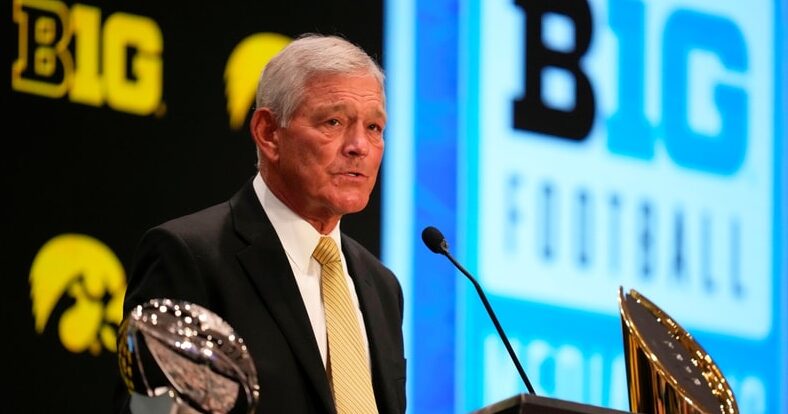Big News for Iowa Hawkeyes
Kirk Ferentz Reflects on Navigating Changes in College Football
As the longest-tenured head coach in college football, Kirk Ferentz of the Iowa Hawkeyes has witnessed significant changes in the sport. Recently, however, those changes have been faster and more transformative than ever before.
Ferentz shared his thoughts on these evolving dynamics, acknowledging that the rapid pace of change has forced him to rethink how to adapt. “Even in normal times, there’s always something that pops up that makes you reflect and think,” he said. “When I was in the NFL, I was more football-centric, focused on film. Now, my scope is broader, and that’s especially true in the past couple of years.”
The landscape of college athletics has shifted dramatically in recent years, with Name, Image, and Likeness (NIL) rights and unlimited player transfers now playing a huge role in how teams build rosters. Ferentz noted, “It’s unprecedented, and not all of it has been positive. But the good news is, we’re taking aggressive steps to create some structure. For the last couple of years, we’ve operated without meaningful guidelines. It hasn’t been ideal for the future of the game, but hopefully, we’re moving toward a more sustainable model.”
One of the most notable changes is the new House settlement, which allows for revenue sharing and provides more oversight for NIL deals. As of now, deals exceeding $600 require third-party approval and must be processed through a new clearinghouse, NIL Go. Alongside this, a new enforcement agency called the College Sports Commission is being implemented to ensure fairness across the board.
These shifts present new challenges for Ferentz and his staff, and while he’s working to adapt, the pace of change remains a challenge. “A lot of it doesn’t make sense, and you can’t always make it make sense,” he said. “You just have to be patient and hope that things get reined in. The recent lawsuits have brought urgency to this process, but now we’re trying to create a structure that will work for everyone involved.”
Ferentz emphasized the importance of dealing with short-term issues while hoping the long-term situation stabilizes. “In the short term, you focus on what’s best for your program, but over time, you hope that the powers that be will bring things under control.”
Reflecting on his early years in coaching, Ferentz noted that discussions about compensating players had been around for decades, though not on the scale we see today. “There were talks about adding incentives to scholarships, rewarding players for tangible outcomes like graduation,” he recalled. “That made sense to me back then. But the landscape has changed drastically.”
Over the course of his 27-year coaching career, Ferentz has seen the revenue explosion in college football. Having spent time in the NFL, he recalls wondering when the financial ceiling would be reached, but the money just keeps growing. “The expansion of TV contracts has skyrocketed, and the idea of tradition and geography has taken a backseat,” he said. “With all the money in the game, it made sense to share it with the players who are the core of the enterprise.”
As he prepares for his 27th season at Iowa in 2025, Ferentz remains focused on adapting to these changes while striving to keep the Hawkeyes competitive in the evolving Big Ten landscape.



No Comment! Be the first one.